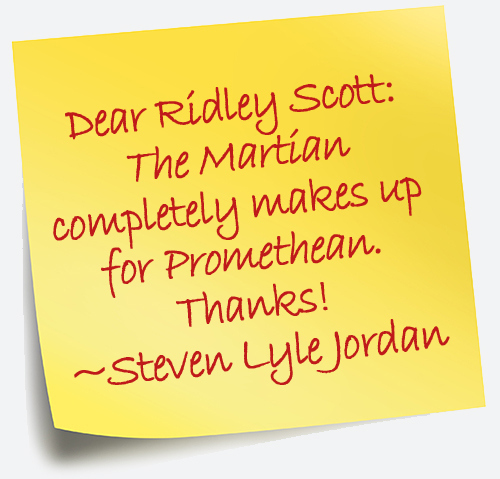Steven Lyle Jordan's Blog, page 24
October 23, 2015
Kestral gets new covers!
 In the interest of I really needed something to do, I’ve created new covers for the three books of The Kestral Voyages.
In the interest of I really needed something to do, I’ve created new covers for the three books of The Kestral Voyages.
All three covers are designed to represent the central themes and/or defining moments of the books. They are also redone in the modern style of avoiding face shots, to allow the audience to imagine their own characters. Mostly, they all use updated and improved graphics, and attempt to emulate the covers of traditional sci-fi in a semi-photo-realistic fashion.
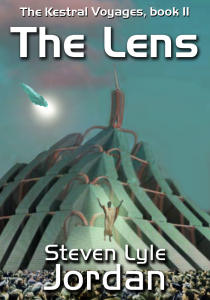 As always, I created these in the hopes of their improving sales of the books. And I do think they look better than the previous covers: It seems the model I chose to represent Carolyn Kestral, a woman who demonstrated the bearing and confidence I envisioned for the character, wasn’t eye-catching enough to bring in audiences. (I’d hate to suggest that it’s just because she didn’t show enough skin or curves… but let’s face it, those are the tired tropes of science fiction covers…
As always, I created these in the hopes of their improving sales of the books. And I do think they look better than the previous covers: It seems the model I chose to represent Carolyn Kestral, a woman who demonstrated the bearing and confidence I envisioned for the character, wasn’t eye-catching enough to bring in audiences. (I’d hate to suggest that it’s just because she didn’t show enough skin or curves… but let’s face it, those are the tired tropes of science fiction covers…
You might be wondering why a writer like me, who so aggressively champions serious and “realistic” science fiction, is making a big deal and all this effort for a very light-hearted series. Well, simply put, The Kestral Voyages books are great sci-fi, very popular with those who have read them, and a lot of fun to write. To this day, they remain my most successful book series, outselling even the highly-rated Verdant series. Popular content deserves a great package, and I wanted to provide it.
Also, I’m not working on any writing projects at the moment, and sometimes I get the urge to sharpen my Photoshop skills and see how good a cover I can create with the somewhat limited image choices for science fiction content. You know, it’s not like you can ask your Vulcan friend to pose in front of his starship for you, so you have to work a bit harder for an SF cover. Sometimes, nothing I can do satisfies me. Other times, I get reasonably lucky and turn out a nice product.
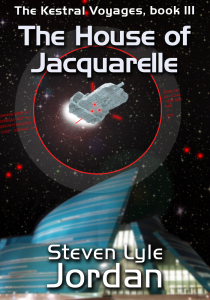 I hope you like all three of these new covers, and that maybe they’ll inspire you to pick up the novels, as well as alerting some of your friends to check them out and read them.
I hope you like all three of these new covers, and that maybe they’ll inspire you to pick up the novels, as well as alerting some of your friends to check them out and read them.


October 19, 2015
Failure of another potluck series
 SyFy has announced the cancellation of Defiance, the transmedia series that was a flagship production for SyFy and has struggled on for three seasons now.
SyFy has announced the cancellation of Defiance, the transmedia series that was a flagship production for SyFy and has struggled on for three seasons now.
Though SyFy had high hopes for this show, Defiance demonstrated the lesson that no show that essentially throws a bucketload of sci-fi tropes into a jacuzzi masquerading as a bubbling pot should be expected to succeed; your intended stew turns out to be tepid, cloudy bathwater. Other sci-fi shows have been done the same way, with not enough thought given to the meat of the premise, the reason anyone should care… and they haven’t lasted long. There was just nothing compelling about Defiance, and it was an easy show to tune away from (or not tune in at all).
Better luck next time, SyFy (as long as you’re not going to try to push another potluck series on us, that is).


October 15, 2015
Twelve things that have outlived their usefulness (#7 will shock you)

Columbus Day: A holiday that has outlived its usefulness.
After a conversation with a friend about the state of the world—and my opinion of that state—I was encouraged to compile this list of the things that I think have outlived their usefulness in society and need to be officially taken off the table and locked away for good. Mind you, this list has the most to do with the United States… but not all of it. There are admonishments enough to go around. So take a look, and you’ll have a much better idea of exactly how crazy I am.
So, without further ado (or a don’t), my list of the top 12 things that have outlived their usefulness includes:
Racism—Great start to this list. Stop trying to separate people according to different physical characteristics that don’t mean a damned thing. We are all members of the Human Race. Time to grow up.
Sexism—See Racism.
Religion—I hate to break it to you, but religion is an invented belief system designed to make the majority of people on the street do what the minority of people in power want them to do. When religions had some bearing on reality—like it did about two millennia ago—they were useful. Today’s major religions, however, have lost touch with reality and the scientific evidence for how the world works… and in teaching their religious dogma, they encourage ignorance about the real world. Wake up and smell the 21st century, people.
Columbus Day—Why are we celebrating a day when a professional explorer got lost and ended up on the wrong side of the planet, but made up for it by leading the systematic enslavement and decimation of entire cultures in the New World? If we insist on having a day off, maybe make it for the Indigenous Peoples of the Americas who were so wronged by Columbus and his European followers (since, now, we know that was a bad thing… right?), or maybe for unwed mothers, or frustrated sci-fi writers, or something.
Manually-driven cars—Only one of the highest causes of death in the U.S., and the main contributor to the planet’s current global warming problem, which will give us a lousy next century. Public transportation is safer and much more efficient, and adequate for the needs of 90+ percent of the American population. Some cities have limited auto access in downtown areas, and they’re on the right track. For the rest of us, safe and efficient self-driving cars are right around the corner; and when they’re here, we need to mandate them, like we did lights, turn signals, seatbelts, airbags and safety bumpers. (And hopefully they’ll be runing on something other than gasoline.)
Reality TV—Invented to be cheap television by cheap TV producers (who aren’t exactly broke), reality TV exists solely to have you laugh at or pity one of the families or groups displayed therein. Do we need encouragement do do that? Not really.
American Football—A sport some say is patterned loosely after warfare. So violent and savage that players must wear loads of protective gear… yet still give themselves lifetime injuries and ruin their physical lives after just a season or two of play. Too complex in the rules to have much fun anymore. Corruption by the owners, who are in it only for the money. Greed of the players, who are only in it for the fame and product endorsements. And its biggest sponsors sell soda, beer and fast food. Period. Some parents are starting to see the light, and are pushing their kids at any other sport but that. Smart parents.
Guns—Yeah. Most countries have taken them out of the hands of civilians, and are better off for it. Guns make it too easy to ruin and end lives, but it turns out they’re not that good at defending lives—even, frequently, in the hands of professionals. In an early United States, where homeowners hunted for food and were concerned about wild animals and the errant foreign soldier showing up, gun ownership made perfect sense. Today? Not at all. Feeling hungry? Go hit Safeway. Feeling defenseless? Buy a taser.
Capitalism—It used to be so hard to produce power and goods for everyone that you had to put people to work producing it. Today, we’ve gotten so good at producing food, goods and services for the world, largely through automation and better efficiency through science, that a top-down system of forced hoarding/scarcity of resources for profit, and bribing leaders to allow it, no longer makes sense (except maybe for the 1% of capitalists who are hoarding 50% of the country’s money). The next age of Mankind will be about sharing the bounty.
Working 35-40 hours per week—Tack this on with the removal of capitalism: We don’t need to work as hard as we do just to bring home the bacon, because capitalism is keeping us from getting the food we need for free. Remove capitalism, and you remove the need to work so much. You’re welcome.
Lack of interest in/appreciation for science—I’m going to put it simply: Science has given us everything we have. We would probably not even exist without it. You would almost certainly not exist without it. Yet people think it’s okay to be willfully and intentionally ignorant about the single greatest human accomplishment that has given us civilization, and made pretty much all of our lives possible. Many even blame science for society’s ills. These people are known by the label of morons. Don’t let them raise children.
Fear of your government—First, you must clearly assume that you would not have your home, job, money or any protection from the ne’er-do-wells of the world without your government protecting you. Second, if you put them in power… and you’re afraid of them… you’re obviously doing it wrong. Government just doesn’t work without the people’s participation. So stop wasting so much time with items 1-11 and pay some f***ing attention to how your country works.


October 13, 2015
Reviving The 4400
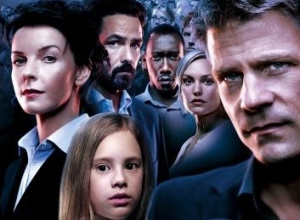 If you just heard a strange, mid-range moan rolling over the glen and bouncing between the buildings, it’s only because I’m too old to do high-pitched squees anymore. Nevertheless, that sound came from me, because I just heard about the effort to bring The 4400 back, with new episodes on Netflix!
If you just heard a strange, mid-range moan rolling over the glen and bouncing between the buildings, it’s only because I’m too old to do high-pitched squees anymore. Nevertheless, that sound came from me, because I just heard about the effort to bring The 4400 back, with new episodes on Netflix!
The 4400 was a fascinating science fiction show, about 4,400 people who suddenly, mysteriously reappeared in a dry lake bed after having disappeared at various times and places over the past 50+ years. Once they had returned, it was discovered that many of them, possibly all of them, had mysterious new powers and abilities, which some thought they had been given for a reason by whoever took them. Jordan Collier, a man who claimed to be one of the 4400, rose to prominence as a spokesman for the group and established a foundation to support the 4400, and to help guide them as they ushered in the world’s salvation… from what, we didn’t know.
And we never found out, because the show was abruptly cancelled at the end of season 4, leaving a massive cliffhanger behind. But now, fans and the cast of The 4400 have started a petition to revive the show.
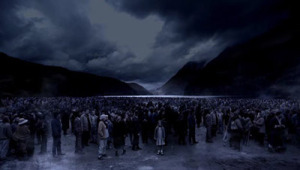 The 4400 was that rare must-see SF TV for me during its run. From its wonderfully moody theme music, to its excellent cast, its fascinating premise and substantial backstory, The 4400 had so much potential as a series. Following shows like Lost, they built on their inherent mystery; but they managed to do it much more effectively, even with characters running around with what amounted to super-powers. The show also dealt wonderfully with the reactions of the rest of the population to the return of the 4400, and then coming to grips with their newfound abilities and what they meant.
The 4400 was that rare must-see SF TV for me during its run. From its wonderfully moody theme music, to its excellent cast, its fascinating premise and substantial backstory, The 4400 had so much potential as a series. Following shows like Lost, they built on their inherent mystery; but they managed to do it much more effectively, even with characters running around with what amounted to super-powers. The show also dealt wonderfully with the reactions of the rest of the population to the return of the 4400, and then coming to grips with their newfound abilities and what they meant.
In this era of remakes and sequels, it’s not surprising that The 4400 has now been tagged as the next series to be brought back (efforts to revive the series have previously failed). But out of most shows, The 4400 is the most deserving of being revived: It was excellent TV; it was great science fiction; and it was left unfinished. Most importantly, the primary characters from the original run are on-board to bring the show back; and knowing the enthusiasm for the show of so many of its quality cast says a lot about the potential of the series.
I urge you: If you like serious science fiction TV, and would love to see a powerful cast and crew bring back a quality show, check out the info on the series and sign the petition. You can also check out The 4400 on Facebook and Twitter (#BringBackThe4400).


October 12, 2015
An Alarming Number Of People Think “The Martian” Is A True Story
 The recent Buzzfeed article, An Alarming Number Of People Think “The Martian” Is A True Story, has generated plenty of laughs and clicks, in its Buzzfeed sort of way. (Tweet #3 is priceless.) But is this something we can just laugh off, or is it indicative of a much greater problem?
The recent Buzzfeed article, An Alarming Number Of People Think “The Martian” Is A True Story, has generated plenty of laughs and clicks, in its Buzzfeed sort of way. (Tweet #3 is priceless.) But is this something we can just laugh off, or is it indicative of a much greater problem?
First, this is Buzzfeed. And their “alarming” number of people who think The Martian is based on a true story are accounted for in exactly 11 tweets. Tweets. Not exactly a landslide of evidence for science-illiteracy. Buzzfeed is obviously poking at the idea that “so many people” know nothing about the world around them, not even pretty significant stuff like—I dunno—whether humans have visited Mars. It’s the kind of question that those who do know significant stuff can easily point at to laugh at the morons of the world and get their superiority on. Without checking, of course, to see if the “alarming” numbers cited are, in fact, a significant portion of the population. Who’s the moron now?
But anyway, we can suppose (in the absence of a scientific poll) that there really are people out there who don’t know humans have never visited Mars. Why not? We know there are people who don’t believe we visited the Moon. Between conspiracy theories and misinformation, movie special effects (which are getting more realistic every day), internet nonsense and Fox News, it’s easy to believe there are those who don’t know our real history of space exploration.
But the only area we can realistically point to as the culprit of this lack of knowledge is our educational system. Any school system that is graduating young people without instilling in them a good background in human history—and I’d say knowledge of what planets we’ve visited, and the limits of science and technology to get us there, would count as important to know—is simply not doing its job.
And we, as a people, shouldn’t be laughing at people who don’t know basic human history like that… as much as we should be getting angry and asking our schools, and our governments, how they could be allowing people without such a basic education out of the schools we pay for with our tax money (or maybe we should be asking, aren’t these people going to schools?).
But maybe we shouldn’t panic; after all, all we know is we’re talking about 11 tweets. So, before we over-react, maybe we should be trying to ascertain how many people without this basic knowledge we’re talking about… that scientific poll I mentioned. Then we can better discuss how to bring them up to speed. And there are many ways to educate people besides school.
We may be able to accomplish the proper dissemination of knowledge through media… more programs like Nova, for instance, but with some reworking to bring them to the attention of more of the populace (namely, those who won’t watch PBS). Other networks, like The Discovery Channel and The History Channel, can provide airtime to programs that better enlighten the audience (they may need to hire a popular celebrity to host the show and bring the viewers in).
 Possibly a great template for such a show might be based on Mythbusters, the very popular program that uses science, and plenty of fun, to test and either prove or dispel popular myths and conjectures about how the real world works. In fact, Mythbusters has already done a program that tests (and thoroughly disproves) the conspiracy theory that the manned Moon landings were faked in a sound stage. A Mythbusters-type show, demonstrating our current state of the science and technology we’d need to get us to Mars, would not only teach about science, but would help inform viewers that we are not yet capable of a manned Mars mission.
Possibly a great template for such a show might be based on Mythbusters, the very popular program that uses science, and plenty of fun, to test and either prove or dispel popular myths and conjectures about how the real world works. In fact, Mythbusters has already done a program that tests (and thoroughly disproves) the conspiracy theory that the manned Moon landings were faked in a sound stage. A Mythbusters-type show, demonstrating our current state of the science and technology we’d need to get us to Mars, would not only teach about science, but would help inform viewers that we are not yet capable of a manned Mars mission.
And, of course, we’ve had series like Cosmos (the original, hosted by Carl Sagan, and the recent version hosted by Neil deGrasse Tyson) and my personal favorite, Connections (hosted by James Burke), that combined scientific and historical lessons with engaging hosts to teach its audience. These shows were popular with viewers, and are used as effective educational media today.
Perhaps if we had regular programs like those, hosted by popular media figures and commanding good and multiple time slots and web-based media outlets, to help provide information about the way the world works and what we’ve done with that knowledge, we wouldn’t be laughing at Buzzfeed articles about less than a dozen twitter posts supposedly attesting to some anonymous peoples’ ignorance that is intended to make the rest of us think there’s a global epidemic of morons out there.
Or maybe—just maybe—we could pay more attention to those around us, and take it upon ourselves to make sure those we know have the adequate knowledge to carry them through life, and not wasting it looking for UFOs, the Loch Ness Monster or… men on Mars.


October 9, 2015
Diversity in media
 Yeah, I know: Even seeing a title like that just makes you want to duck and cover… it’s that hazardous, poisonous and unforgiving a subject. And it’s easy for perfectly intelligent and reasonable people—like The Martian star Matt Damon—to say something off-the-cuff that will make them look like racist idiots to many.
Yeah, I know: Even seeing a title like that just makes you want to duck and cover… it’s that hazardous, poisonous and unforgiving a subject. And it’s easy for perfectly intelligent and reasonable people—like The Martian star Matt Damon—to say something off-the-cuff that will make them look like racist idiots to many.
So why am I going there? Am I asking for trouble by even opening my mouth? Well, probably. But the fact is, the issue of diversity is such a knife-edged subject specifically because we’re all so frightened to discuss it… we’re all afraid that, even when we think we know what we’re doing, it’s still going to blow up in our faces like a century-old stick of dynamite (very soft call-out to Daniel Roebuck… we hardly knew ye, Les).
In the example alluded to above, Matt Damon recently tried to explain the issue of diversity when it comes to movie-making, downplaying the need for diversity behind the camera (and it didn’t help that he was trying to tell this to African-American film producer Effie Brown). His comments were so badly managed that they completely obscured his support of the need for diversity on-screen. Without condemning or lionizing his statements, I’ll just say that the point he was trying to make was utterly ruined by his poor choice of words. Okay, so Damon’s not great on thinking on his feet. At all. And the dynamite that is popular media predictably took his head off.
A lot of people believe you can only tell a story you’ve lived. Many authors and even a few moviemakers live by this mantra. And many minorities believe that non-minorities are frankly incapable of telling minorities’ stories well—or at all—because they can’t really understand something they haven’t lived. I believe Effie Brown’s comments reflect this opinion; and her opinion also happens to be a popular way of advising those in power that there should be more diversity in their businesses in order to assure full understanding, appreciation and consideration for those minorities.
Matt Damon’s disagreement comes from his being an actor—someone who’s played various types of characters, from astronauts to angels, good, bad, accomplished and stupid—and his believing that an actor, or for that matter a writer, director, set dresser or dialogue coach, doesn’t need to have actually lived an experience in order to portray it well through acting… or writing, directing, set dressing or voice coaching.
I fully support a diverse workplace, of course. However, I don’t agree with the argument that, by Brown’s example, only an African-American can understand the issues faced by another African-American. This is a false logic, based on an idea of inherent and absolute differences between groups that cannot be appreciated by those outside of those groups. All African-Americans are not the same; nor have they all had the same experiences, any more than every African, Asian, European, Indian, Latino, Mediterranean or Inuit has. And we, as a people, have learned enough about the experiences of others to be able to fully empathize with those unlike us, or know how to learn enough through sharing stories to achieve that empathy.
As a writer who has told stories of men and women, hetero and homosexual, mean and pacifist, smart and stupid, and every color of the racial rainbow… as well as people from other planets, and beings that weren’t even remotely human… I know that intelligence, empathy, imagination and research can come close enough to approximating actual experience for a good writer to be able to tell a genuine-sounding story to others. I know how to tell stories that I haven’t, in fact, lived. And I’m not alone, as anyone who’s a fan of science fiction or fantasy can attest.
 Right now, the greatest advantage to encouraging and practicing diversity is to remind people of how different we all are, how wide our experiences range, and how incredible a mosaic we all live in. In what is still a pretty unbalanced popular media in the U.S., we use every tool at our disposal to promote and establish that diversity, including the occasional delving into false logic to make a point. We should encourage businesses where anyone, of any type, can play a part. But we need to accept that, at heart, the color of our skins do not separate us. Diversity is a tool… it is not the point.
Right now, the greatest advantage to encouraging and practicing diversity is to remind people of how different we all are, how wide our experiences range, and how incredible a mosaic we all live in. In what is still a pretty unbalanced popular media in the U.S., we use every tool at our disposal to promote and establish that diversity, including the occasional delving into false logic to make a point. We should encourage businesses where anyone, of any type, can play a part. But we need to accept that, at heart, the color of our skins do not separate us. Diversity is a tool… it is not the point.


October 6, 2015
Writing movies in book form
“All my books start in my head as films or documentaries that I then have to adapt for a novel. If I can’t see it, I can’t write it,” says Karen Traviss, author of Going Grey. “In every scene, I’m walking the point of view character through a three-dimensional landscape and interacting with it through the characters’ eyes, seeing what they see and thinking what they think. Even my scene and chapter transitions are often pretty much the ones I learned making documentaries and features, almost to the point of dissolves and fades.”
I love this quote, from the IO9 article The Secret of Writing An Action Movie in Book Form. The article and various comments from notable authors pretty accurately describe the way I wrote my novels, which I always self-described as akin to transcribing a movie to book form. In my head, I would compose a scene, imagine dialogue and action that would look and sound good on-screen, and reconstruct that into words designed to capture that action and mood.
I regularly “animated” my characters by picturing certain actors—sometimes in one of their memorable roles, say, Sean Connery playing James Bond… sometimes imagining them in a role that they’ve never played, say, Katherine Hepburn playing Lara Croft—then imagined how they will react in the situations I’d put them in, as if I was watching them act it out on-screen. I also wrote minimal internal dialogues, preferring to have my characters react directly to the events around them in a way that would be obvious to someone watching the scene. That made it easier, for me, to create realistic dialogue, predict actions and reactions, and set the pace and flow of a story.
And I noticed early on that when I wrote my novels, I tended to keep chapters to the same approximate length throughout the book… almost as if I was keeping time with the story and adding predictable and appropriate dramatic pauses-slash-commercial breaks. This was something I didn’t actually plan; it just seemed to happen, almost subconsciously, as I outlined and then wrote the story.
How well has it worked? Well, I’ll just modestly point out my 4.4-star ratings average on Amazon, and leave it there.
Yes, my stories are very cinematic… as opposed to, I suppose, being literary. I tried to match the tone and feel of a movie or television show, compose the same kind of scenes, strike the same kind of dialogue that you’d hear on screen… which, to me, is more natural than the action and dialogue you usually get in a literary novel. It was that ability which prompted a television exec and old friend of mine to invite me to work on teleplays for some prospective projects of his. And I found that writing teleplays wasn’t much of a stretch for me; just taking the kind of storytelling I was already doing, and putting it into an actual script format.
There are differences in the way you approach storytelling from one medium to the next: The staging, dialogue and descriptions you use in one medium, say, books, isn’t the same as what you’d use in movies, or in comic books, or in radio plays. But borrowing the storytelling cues from one can give you great new ways of expressing yourself in another.


October 3, 2015
Thank you note
September 29, 2015
The Book of Eli
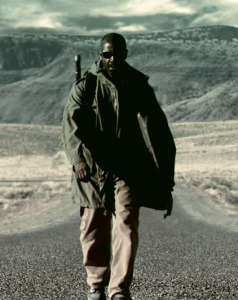 I only just saw The Book of Eli for the first time on television last weekend. Although I’d heard that it was a great movie, I’d missed catching it in the theaters, and then I never heard another word about it.
I only just saw The Book of Eli for the first time on television last weekend. Although I’d heard that it was a great movie, I’d missed catching it in the theaters, and then I never heard another word about it.
And no wonder: It’s a post-apocalyptic drama, but without fleets of cobbled-together vehicles, bald musclemen with feathered headsets and skull-makeup, buckets of blood and broken bone spurting everywhere, world-spanning trains, robo-suited troops or zombie attacks. In other words, it’s the kind of movie that critics would have spoken well of, but the public must have been bored to death watching.
Well, if you were one of those movie-goers who just skipped this one, or missed it when it came to town, I’m here to tell you now: If you like serious drama and realistic adventure in a post-apoc setting, you’re not going to do much any better than this one. The Book of Eli kicks ass.
First, you can’t do wrong with a movie starring Denzel Washington as Eli and featuring Gary Oldman as the chief bad guy, Carnegie; man, the chemistry between them was electric. In fact, watching Washington alone (he probably gets in 95% screen time) is captivating enough to make up for the fact that, between him and Oldman, none of the rest of the cast is particularly strong or significant. The only other notable character is Solara, played by Mila Kunis, the daughter of Oldman’s blind and regularly-abused “wife” (played by Jennifer Beals), and who decides to hitch her wagon to Eli when he shows up in her town. But Solara isn’t a love-interest; she’s merely a new charge Eli reluctantly accepts on his journey west, with his special cargo.
The cargo is, of course, a book—the book—a King James Bible, supposedly the last of its kind. Eli states that when the world fell to a nuclear war, many people blamed religion for the initial conflicts, and all religious books were sought and burned. Eli was told “by a voice, which I heard as clearly as I hear you” to take his bible west, to a place that would preserve it. So Eli is on the road, with just his meager supplies, and the book, struggling to survive, and dealing with other survivors, and the occasional marauding band, with amazing skill.
Carnegie runs what’s left of a small western town, and he seeks the one thing he discovers Eli has: A bible. He is aware of the power in the words of the Bible, and he hopes to use it to better control his people, draw others to him, and lead the world out of its present chaos. His goal may be honorable, but it’s also particularly skeevy, and Eli refuses to give up the book. Here is our story’s conflict, which seems predictable enough… until, suddenly it isn’t (Spoilers follow in the blockquote).
Carnegie gets the Bible; a seriously wounded Eli continues west without it, but with Solara in tow; and they reach their ultimate goal, which turns out to be a makeshift museum embedded on Alcatraz Island.
Which is where the double-twist comes in: Eli doesn’t need the King James Bible, because he memorized it long ago; and Carnegie can’t use the Bible he’s stolen, because it’s… in braille. Yes, Eli is blind, something that is made obvious at the end of the movie; though when you realize it you’ll probably start to recall moments of Eli’s actions and behavior that indicated his blindness and subsequent heightening of his other senses… if you knew what to look for. And further insult is added to Carnegie’s injury when his wife, long-suffering at his hands, knows braille, but cruelly refuses to read the Book for him.
The palette of the movie is wonderfully bleak, and very monochromatic, especially when you consider the way Eli experiences the world during his travels. Other than Eli’s preternatural fighting skills, there is little over-the-top or outlandish about this story; there is no soaring music or triumphant melodramatic moments; it’s a straightforward drama with nothing but believable characters.
I realize that a lot of people would rather watch movies like Mad Max, World War Z or I Am Legend to get their post-apocalyptic thrills. But for me, a movie that depicts the realistic aftermath of a horrible fall of humanity is much more interesting and infinitely more powerful. And instead of crazy stunts, impossible heroic moments, bwaa-ha-ha! and it’s a lovely day! posturing… depicting the pitting of two dominant wills, both with (to their mind) believable and realistic goals, is so much more satisfying (for the hero) and biting (for the villain).
The movie doesn’t have a powerful religious message, although the popular phrase you reap what you sow figures prominently in this story. In fact, you really can’t call this movie science fiction just because it takes place in the future. This is post-apocalyptic fiction, pure and simple, and more realistic than the last 1o cheesy post-apoc movies out there. The Book of Eli is a 5-star drama all the way.


September 26, 2015
The Player can’t be much more cynical about humanity

Philip Winchester, star of The Player.
This week’s premier of the new series The Player has given us that rare animal, the original TV show premise… which alone was enough to get my interest and, fresh after my high of watching the premier of Heroes Reborn, insured that I was going to give the new show a watch.
But although I liked the show, I have to admit that this series has got to have about the lowest opinion of humanity you can get without heading straight for the suicide booths.
It’s summed up in a comment made by the main character, Alex Kane: “All the resources you have, to help people… and you do this?”
This being gambling: Specifically, gambling on crimes. Crimes that get people killed. We’re talking about a super-secret organization of multi-billionaires who are so bored that they’ve arranged for the creation of a super-sophisticated intelligence system (the only admittedly vague sci-fi connection this series has) that can accurately predict when heinous crimes are going to happen, and their probable outcome. Then, to sweeten the pot (and the TV’s plot), they pay some typically ex-military intelligent badass to go in and foil the crime—and survive the attempt—and they bet on his odds of succeeding.
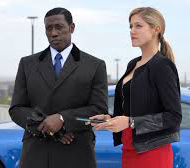 So Alex Kane is the player, getting his assignments from Cassandra, the game’s “dealer,” who works for Mr. Johnson, the mysterious “pit boss.” He takes on his first assignment after his wife is killed, and he thinks he can catch and kill her killer. But there’s something fishy about the murder; was it arranged, just to get Alex to cooperate?
So Alex Kane is the player, getting his assignments from Cassandra, the game’s “dealer,” who works for Mr. Johnson, the mysterious “pit boss.” He takes on his first assignment after his wife is killed, and he thinks he can catch and kill her killer. But there’s something fishy about the murder; was it arranged, just to get Alex to cooperate?
And Alex, who has apparently had some good and bad moments in his past, and has reason to question his own motives, is quietly upset about an organization of people who can help humanity—most importantly, who have the resources to actually predict crimes and take action to prevent them—and instead, sits back and places bets on the possibility of their player, who is given limited access to information, can save a life and preserve his own.
And although the dealer is encouraging, trying to convince him she is all for his efforts to “do good” with what resources he has… you know that, like any dealer, she is paid to encourage people to think they have a chance against the house.
Perhaps not since The Prisoner has a television show had a more loathsome opinion about essential human nature than this. These aren’t evil aliens, vampires, or a corrupt politician or industrialist; these are rich bastards gambling multiple millions against human lives, just to alleviate their 1-percentile boredom. I mean, that’s damned low, people.
Sure, the show is exciting in the usual TV action show way. But trying to get past that premise may be… challenging. I may find myself giving considerable thought to whether I can watch a show which has such a crappy attitude about people. And I’d bet a lot of people will tune in hoping to see Alex figure all this out and kill some of the people behind it. But he never will. As the show’s opening shot perfectly illustrates: You can’t beat the house.





